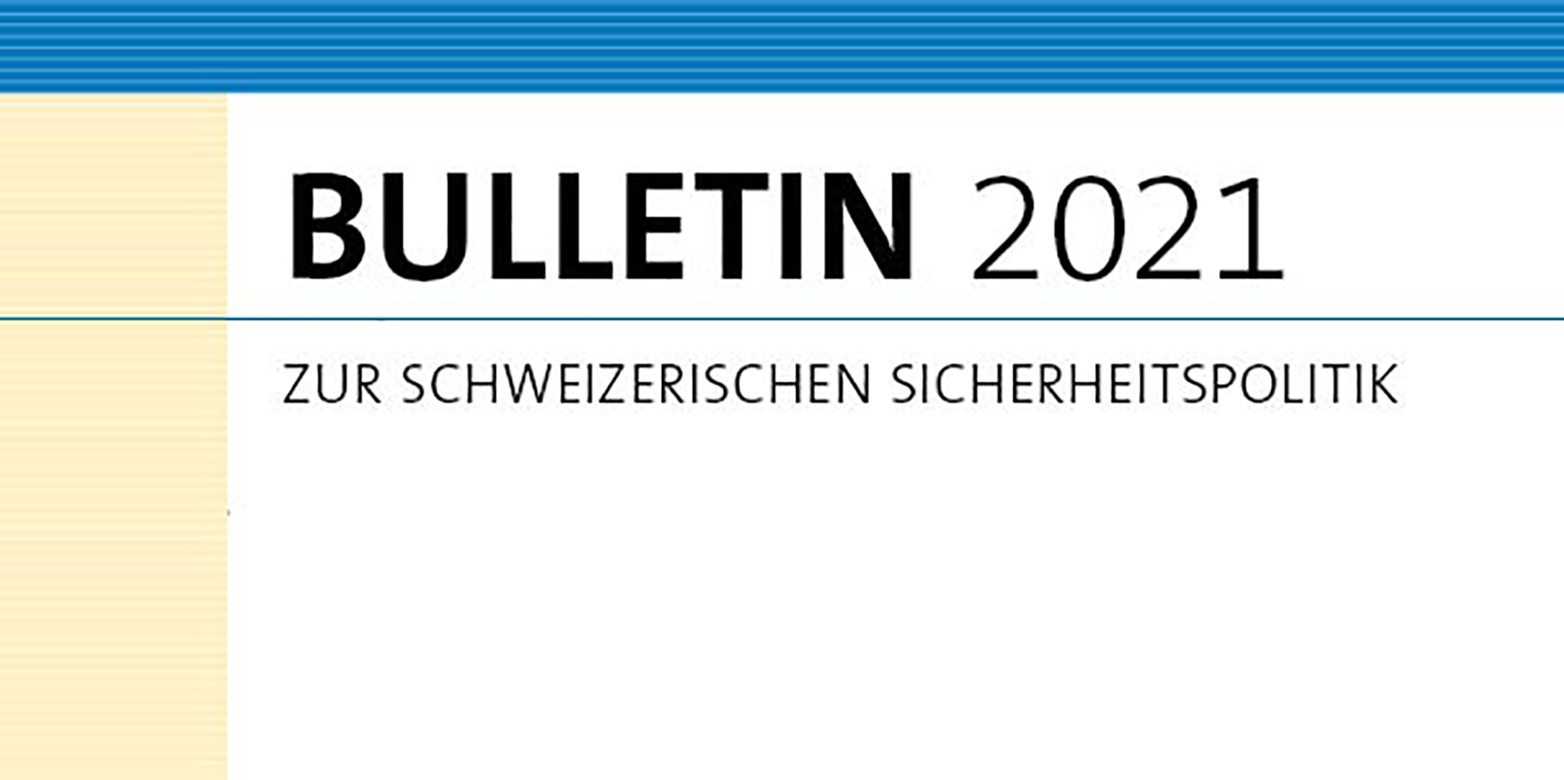Bulletin 2021 on Swiss Security Policy
This year’s Bulletin on Swiss Security Policy starts with an interview with Federal Councilor Viola Amherd. In the following five contributions, our authors address the opportunities for Switzerland through a seat on the UN Security Council, a basis for the debate on a general compulsory military service, Switzerland as a co-creator of the digital space, challenges and opportunities for the OSCE due to changing multilateralism, and international stability and the security of digital products.

Read the Bulletin 2021 here (in German)
Interview
«Wir brauchen Pandemiebekämpfung und Luftverteidigung»
In this interview for the Bulletin 2021, Federal Councillor Viola Amherd talks about the attractiveness of the Swiss Armed Forces, the fight against the COVID-19 pandemic and the latest Security Policy Report. She assesses the opportunities and challenges of involving women in tomorrow's armed forces as well as the debate on the introduction of a compulsory service for both genders. In the context of the COVID-19 pandemic, Amherd also reflects on the improvement potential in Swiss crisis management and on the targeted deployment of military units. Finally, she highlights the current security challenges for Switzerland in the context of an intensifying great power competition, hybrid warfare and climate change and explains what this means for the commitment of the Swiss Armed Forces at home and abroad.
Discussion of Current Events
Chance auf der internationalen Bühne: Die Schweiz im UNO-Sicherheitsrat
In this contribution to the Bulletin 2021, Fabien Merz focuses on the United Nations Security Council. Switzerland has a good chance of being elected for the first time as a non-permanent member of the UN Security Council for the 2023/24 period. According to the author, the seat is a historic opportunity to contribute to peace on the international stage. In order to contribute profitably to this body, which is dominated by the permanent members, Switzerland can benefit from the experience of other smaller members elected into the Security Council.
Allgemeine Dienstpflicht: Grundlage für eine Debatte
In this part of the Bulletin, Boas Lieberherr and Benno Zogg deal with the current debate on the introduction of a general compulsory service for both genders in Switzerland. This idea is increasingly discussed in Switzerland and is met with widespread sympathy. According to the authors, however, the debate is still new and undifferentiated. A general compulsory service would be equivalent to a fundamental system change and would have far-reaching consequences in terms of security, state and economic policy.
Die Schweiz als Mitgestalterin des digitalen Raums
In this part of Bulletin 2021, Julian Kamasa focuses on Switzerland's role in co-shaping the digital space. The digital space has become a policy field like land, sea, air, and space, but one where private-sector actors play a dominant role. It is also caught up in the competition between great powers. According to the author, Switzerland, for which an open, free, and rule-based digital space is essential, faces the central challenge of preserving its own values and scope of action in foreign policy in a little developed, novel policy field. The Digital Foreign Policy Strategy 2021-2024 provides useful guidelines in this regard.
From the CSS
Multilateralismus im Umbruch: Herausforderungen und Chancen für die OSZE
In this contribution to the Bulletin 2021, Lisa Watanabe examines current challenges and opportunities for the Organization for Security and Co-operation in Europe (OSCE) in the context of Secretary General Thomas Greminger's mandate, which ended in 2020, and the increasing polarization among OSCE member states. In addition, it refers to the CSS publication "Multilateralism in Transition", which was published in the summer of 2021 on the same topic. The five main messages of this publication regarding consensus-building within the OSCE, its long-term focus on conflict resolution and new challenges for the organization are summarized in this contribution.
Internationale Stabilität und die Sicherheit digitaler Produkte: der «Genfer Dialog»
In the final contribution to the Bulletin 2021, Nele Achten talks about the Geneva Dialogue launched by the Swiss Federal Department of Foreign Affairs (FDFA), which engages both states and private corporations on the issues of global cybersecurity and cyber foreign policy. In the still young history of the dialogue, the author distinguishes between two phases, an initial positioning phase and a subsequent exchange phase. The author then concludes with an assessment of the future of the platform and its positioning within Swiss foreign policy until 2024.